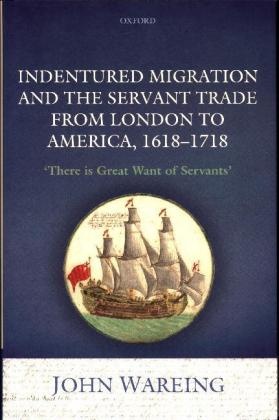Read more
The key role played by indentured servants in the settlement and development of the English colonies in the West Indies and the North American mainland in the first century of English colonisation has been overshadowed by interest in the much larger later trade in African slaves. 'There is Great Want of Servants' provides the first full examination of the English trade in indentured servants, which delivered the majority of an estimated 457,000 white people who migrated to the American colonies before 1720. English colonisation intended to create 'new Englands out of England' - to enlarge trade and plantation - but settlement required people to work the land. Labour had to be transported over 4,000 miles of threatening ocean in a new system of indentured servitude, in which people paid for their transportation and keep, with four years of unpaid service for adults, and more for children and adolescents.
The system was not benign, neither in the sugar plantations of the West Indies and the tobacco plantations of Maryland and Virginia, nor at the centre of the trade in London and in other ports such as Bristol. Merchants, procurers, and masters of ships often used illicit methods to recruit servants as human cargo. Measures to reduce spiriting by making the offence a felony punishable by hanging, or registering servants in new offices, had little effect. The 1718 Transportation Act eased servant recruitment, but when wars in 1689-1697 and 1702-1713 disrupted the supply of servants, and demand for the addictive products of the sugar and tobacco colonies soared in Britain and Europe, white servants were increasingly substituted by African chattel slaves.
List of contents
- Part I 'The worthy action of enlarging trade and plantation'
- 1: 'To advance the honour of our country'
- Part II 'There is Great Want of Servants': The Indentured Servant Trade 1618-1718
- 2: English Indentured Migration: Origins, Destinations, Substitutions
- 3: The Traders in the London labour market
- 4: The Transported and the Traded from London
- Part III Controlling Criminality in the Servant Trade 1640-1718: Courts and Registries
- 5: Prosecution in the Courts and the Failure to Reinforce the Criminal Law, 1640-1673
- 6: Problems in Implementing Servant Registration, 1664-1718
- 7: England's first transatlantic labour trade, 1618-1718
- Appendix
About the author
John Wareing was formerly Head of the School of Geography and Environmental Studies in the University of North London. He is a well-travelled Historical Geographer with a doctorate in History and a long-standing interest in migration and indentured service to the American colonies. He has spent enjoyable periods in libraries and record offices in England, North America, and the West Indies, and his early retirement gave him the opportunity to question and revise some of the conclusions published about the early indentured servant trade from London.
Summary
The first full examination of the English trade in indentured servants, who paid for their transportation and keep, and continued to work unpaid for years on their arrival. Often these people were deceived and coerced, despite half-hearted government efforts to curtail the activities of what was, after all, a useful crime for the English state.
Additional text
The book is at its strongest in explaining how the servant trade in England worked ... this book adds significantly to our understanding of how English merchants organized one major stream of migration to the Americas
Report
His work is a nice addition to the existing scholarship. It provides a careful exploration of the London side of the servant trade and the work that went into gathering both willing and unwilling volunteers for transport across the Atlantic. Allison Madar, The Journal of Transport History

